Social Cognition and Affective Neuroscience (SCAN) Lab
Investigating Social Psychology and Neuroscience on the Merrimack College Campus.
Our research broadly examines the mechanisms by which behaviors, emotions, and memories can be altered by our past experiences or external/internal factors and can be improved by interventions.
The SCAN Lab at Merrimack College investigates:
- The social cognition and behavioral neuroscience of emotion regulation.
- The impact of sleep on learning, memory, and emotions.
- The impact of motivation and external/internal factors on performance.
SCAN Lab's Main Areas of Research
Concussion & Emotion Regulation Research
Regulation of Emotion and Sleep Extension post TBI (RESET) Project
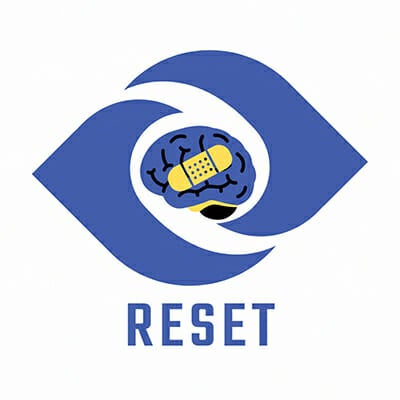 Following an mTBI (also known as a concussion), individuals often report issues of emotion regulation – they feel irritable, anxious, depressed, more easily frustrated, etc. In addition, they report issues with sleep, including trouble falling or staying asleep, having restless sleep, or feeling generally fatigued. Given that sleep can also affect our abilities to regulate emotion, this study seeks to examine the relationship between sleep, emotion regulation and mTBI.
Following an mTBI (also known as a concussion), individuals often report issues of emotion regulation – they feel irritable, anxious, depressed, more easily frustrated, etc. In addition, they report issues with sleep, including trouble falling or staying asleep, having restless sleep, or feeling generally fatigued. Given that sleep can also affect our abilities to regulate emotion, this study seeks to examine the relationship between sleep, emotion regulation and mTBI.
We are currently recruiting participants between the ages of 18-35 years of age. Email ConcussionResearch@merrimack.edu for more information.
IMPairment of Affective Cognition post TBI (IMPACT)
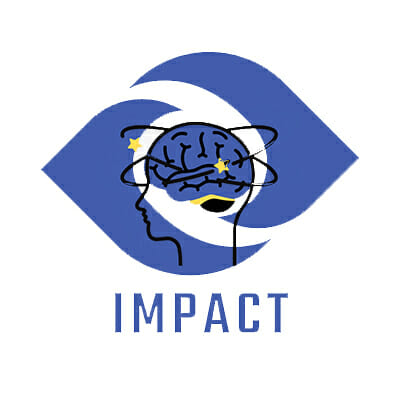 Following a mTBI (also known as a concussion), individuals often report issues of emotion regulation – they feel irritable, anxious, depressed, more easily frustrated, etc. However the mechanism by which mTBI can also emotion regulation is not well understood. This study seeks to examine the neurophysiological underpinnings of emotion dysregulation following a mTBI.
Following a mTBI (also known as a concussion), individuals often report issues of emotion regulation – they feel irritable, anxious, depressed, more easily frustrated, etc. However the mechanism by which mTBI can also emotion regulation is not well understood. This study seeks to examine the neurophysiological underpinnings of emotion dysregulation following a mTBI.
We are currently recruiting participants between the ages of 18-35 years of age. Email ConcussionResearch@merrimack.edu for more information.
INvestigation of Slow Paced Inhalation for the Regulation of Emotion (INSPIRE)
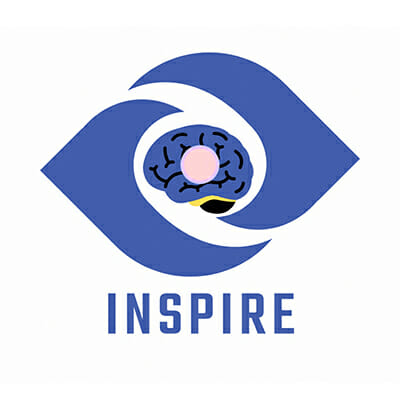 Following a mTBI (also known as a concussion), individuals often report issues of emotion regulation – they feel irritable, anxious, depressed, more easily frustrated, etc. However the mechanism by which mTBI can also emotion regulation is not well understood. This study seeks to examine the neurophysiological underpinnings of emotion dysregulation following a mTBI.
Following a mTBI (also known as a concussion), individuals often report issues of emotion regulation – they feel irritable, anxious, depressed, more easily frustrated, etc. However the mechanism by which mTBI can also emotion regulation is not well understood. This study seeks to examine the neurophysiological underpinnings of emotion dysregulation following a mTBI.
We are currently recruiting participants between the ages of 18-35 years of age. Email INSPIRE@merrimack.edu for more information.
Social Psychology Research
BEhavior, sTereoType, and pERformance (BETTER) Projects
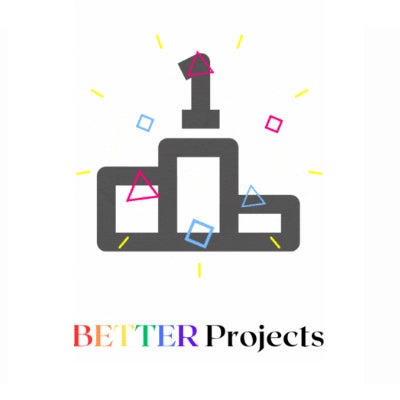 These projects are broadly interested in motivation and performance. Motivation is our drive, our passion, our reason to exert effort and achieve something. Most of the things we do have an end goal, whether it is to get an “A” in the class, be a good person, take out the trash, etc. These projects are interested in what motivates us — what drives us to act one way versus another way in order to achieve a goal — and why and how certain aspects of a situation influence us while others do not.
These projects are broadly interested in motivation and performance. Motivation is our drive, our passion, our reason to exert effort and achieve something. Most of the things we do have an end goal, whether it is to get an “A” in the class, be a good person, take out the trash, etc. These projects are interested in what motivates us — what drives us to act one way versus another way in order to achieve a goal — and why and how certain aspects of a situation influence us while others do not.
In another line of research, projects examine the effects of implicit biases and stereotypes, specifically in how biases impact our behaviors.
Email seitchika@merrimack.edu for more information or to participate in studies.
Eye Tracking During a Shooter Decision-Making Task
 Eye Tracking During a Shooter Decision-Making Task
Eye Tracking During a Shooter Decision-Making Task
A series of studies tracks eye movements while completing a shooter task where individuals shoot an armed target.
This research is part of the Behavioral, Stereotype, and Performance (BETTER) Lab at Merrimack College.
Email seitchika@merrimack.edu for more information or to participate in studies.
Athlete Mental health Program (AMP)
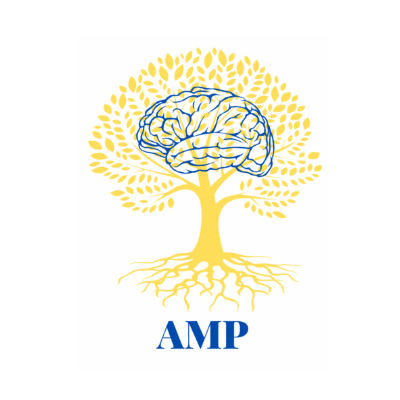 College athletes must juggle packed schedules, academic responsibilities, and sports-specific demands, which may make them more susceptible to certain mental health issues as compared with the general population. Athletes also have an increased risk of mental disorders upon retirement from sports if their identity is closely tied to being an athlete. This study aims to develop a comprehensive mental health program for athletes that fosters athlete well-being and mental health as well as promotes social support by having coaches, staff, and the athletes themselves understand early warning signs, destigmatize reporting, and develop and grow one’s identity outside of athletics.
College athletes must juggle packed schedules, academic responsibilities, and sports-specific demands, which may make them more susceptible to certain mental health issues as compared with the general population. Athletes also have an increased risk of mental disorders upon retirement from sports if their identity is closely tied to being an athlete. This study aims to develop a comprehensive mental health program for athletes that fosters athlete well-being and mental health as well as promotes social support by having coaches, staff, and the athletes themselves understand early warning signs, destigmatize reporting, and develop and grow one’s identity outside of athletics.
This research is part of the Behavioral, Stereotype, and Performance (BETTER) Lab at Merrimack College in collaboration with Drs. Michael Corcoran and Christine Shaw.
Email amhs@merrimack.edu for more information or to participate in studies.
Neuroscience Research
Anxiety SLeep Extension and Emotion Perception (ASLEEP) Project
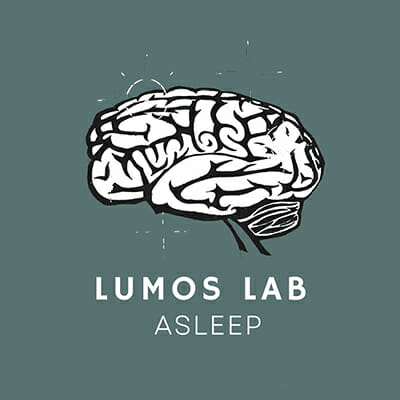 Anxiety and sleep have a bidirectional relationship – anxiety makes it harder to sleep, and sleep can help you manage your symptoms of anxiety. This research examines how sleep can impact the way those with and without anxiety perceive, respond to, and remember emotional information.
Anxiety and sleep have a bidirectional relationship – anxiety makes it harder to sleep, and sleep can help you manage your symptoms of anxiety. This research examines how sleep can impact the way those with and without anxiety perceive, respond to, and remember emotional information.
This research is part of the Learning, Memory and Sleep (LUMOS) Lab at Merrimack College.
Memory Instructions and Nocturnal Direction (MIND) Project
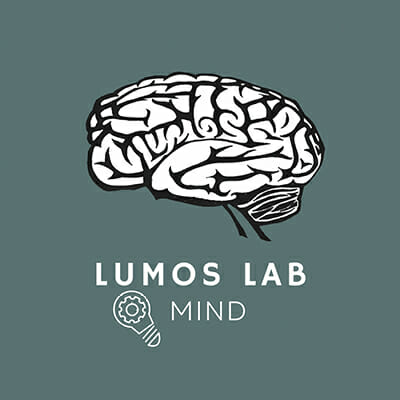 Sleep improves memory, but can sleep also improve forgetting? Forgetting is a necessary and integral part of our brain’s healthy functioning. This line of research examines the role of sleep in helping the brain identify not only the important information to remember for the future, but also the unimportant things that can, and should, be forgotten.
Sleep improves memory, but can sleep also improve forgetting? Forgetting is a necessary and integral part of our brain’s healthy functioning. This line of research examines the role of sleep in helping the brain identify not only the important information to remember for the future, but also the unimportant things that can, and should, be forgotten.
We are currently recruiting participants between the ages of 18-35 years of age and between 65-85 years of age. Email MIND@merrimack.edu for more information.
This research is part of the Learning, Memory and Sleep (LUMOS) Lab at Merrimack College.
Current Research Methodologies: Tools We Use
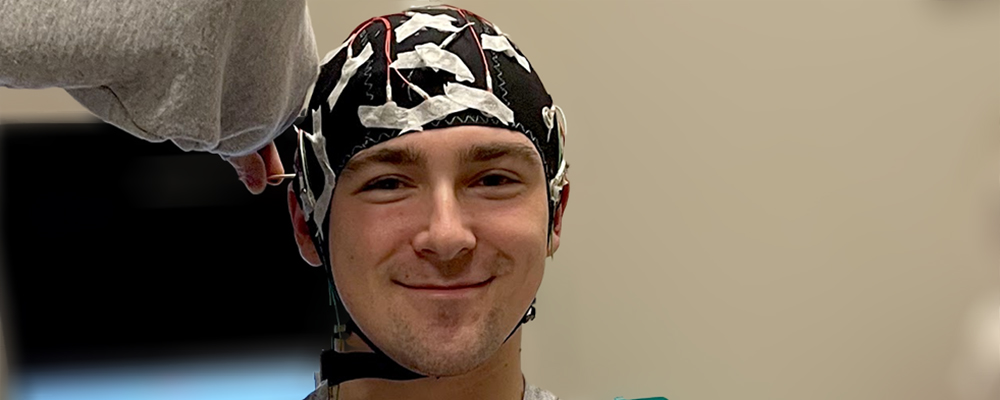
Neurophysiology
The SCAN Lab uses Brain Vision electrodes to record brain activity while you are:
- asleep (PSG)
- awake (EEG)
- actively participating in a behavioral task (ERP)
Eye Tracking
When you participate in an eye-tracking study, the eye tracker will examine:
- Where you are looking on a computer screen
- How long you are looking at certain stimuli
- How your pupils respond to stress or arousal
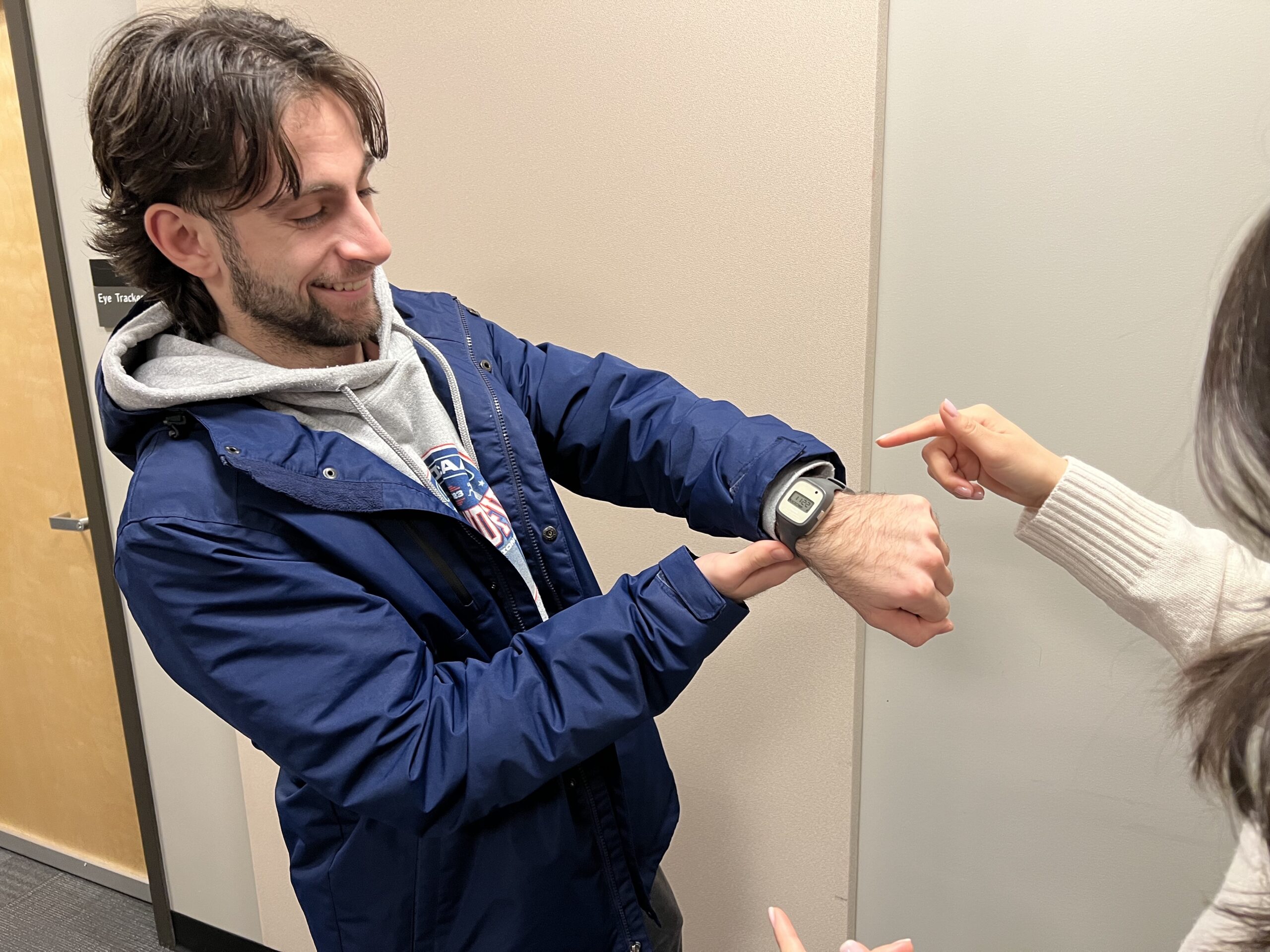
Actigraphy
The SCAN Lab uses actigraphy – a research-specific watch – to track a participant’s activity levels and sleep bouts.
Actigraphy can give us information about a participant’s typical sleep patterns.
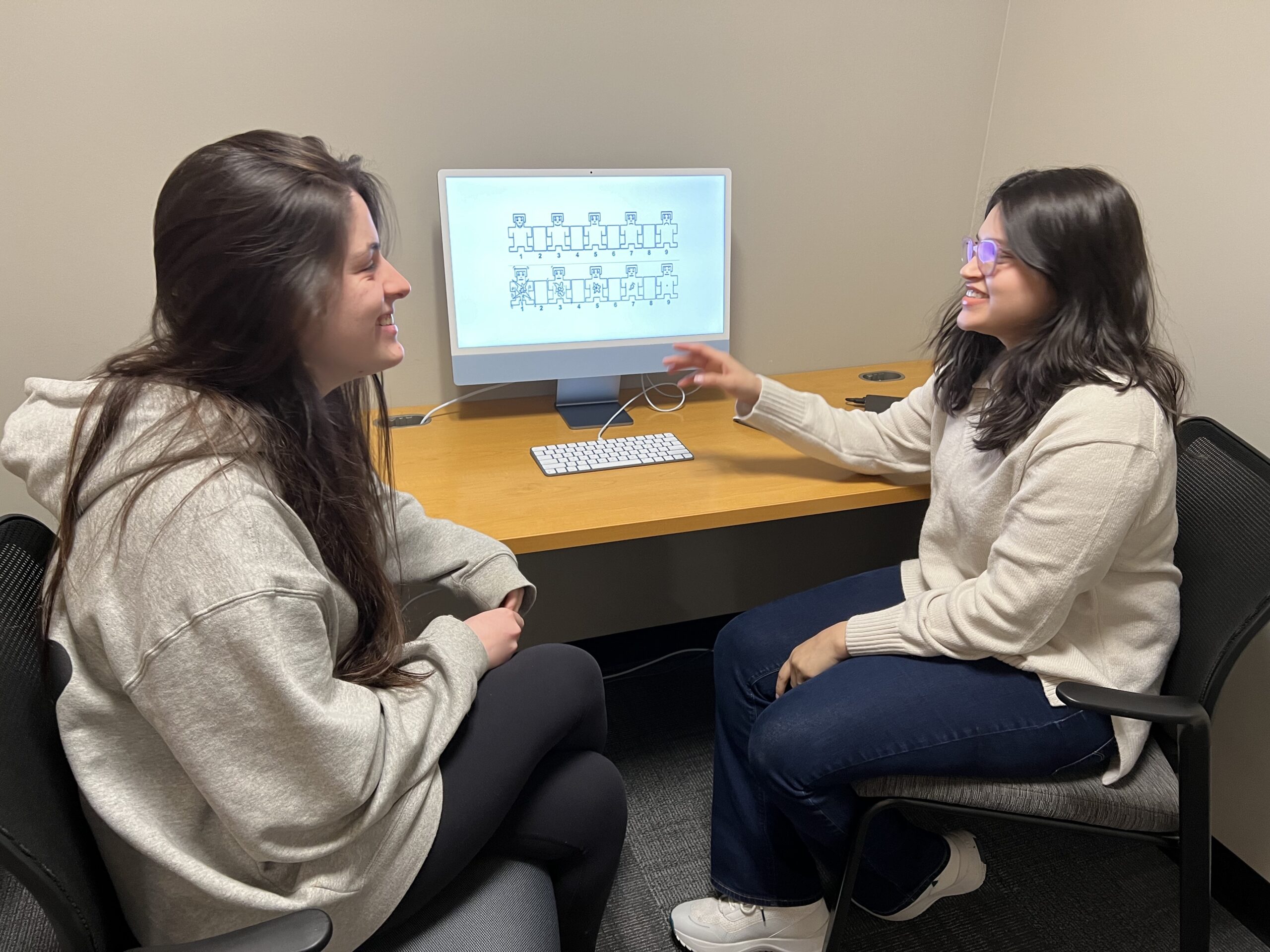
Behavioral Tasks
Our team uses behavioral tasks to test participants under a variety of conditions and following different interventions.
We test for:
- Emotion regulation & attention
- Memory
- Judgment
- Motivation
- Performance
- Cognition & perception
Participating in Research
More than a thousand Merrimack students have conducted SCAN lab research or served as participants since our inception in 2018. Plus, the SCAN Lab has measured more than 5,000 hours of data collection in our designated lab.
Participate in Research for Course Credit
- Some classes will allow you to participate in research to earn course credit or extra credit.
- To schedule participation in studies for credit, please visit the SONA website. If you are in a class that allows research participation to count towards credit, you should have a SONA login.
Participate in Research for Payment
- We have several studies where we can pay participants for their time through Amazon or Dunkin’ gift cards.
- The payment amount is dependent on the length of time spent participating in the research study.

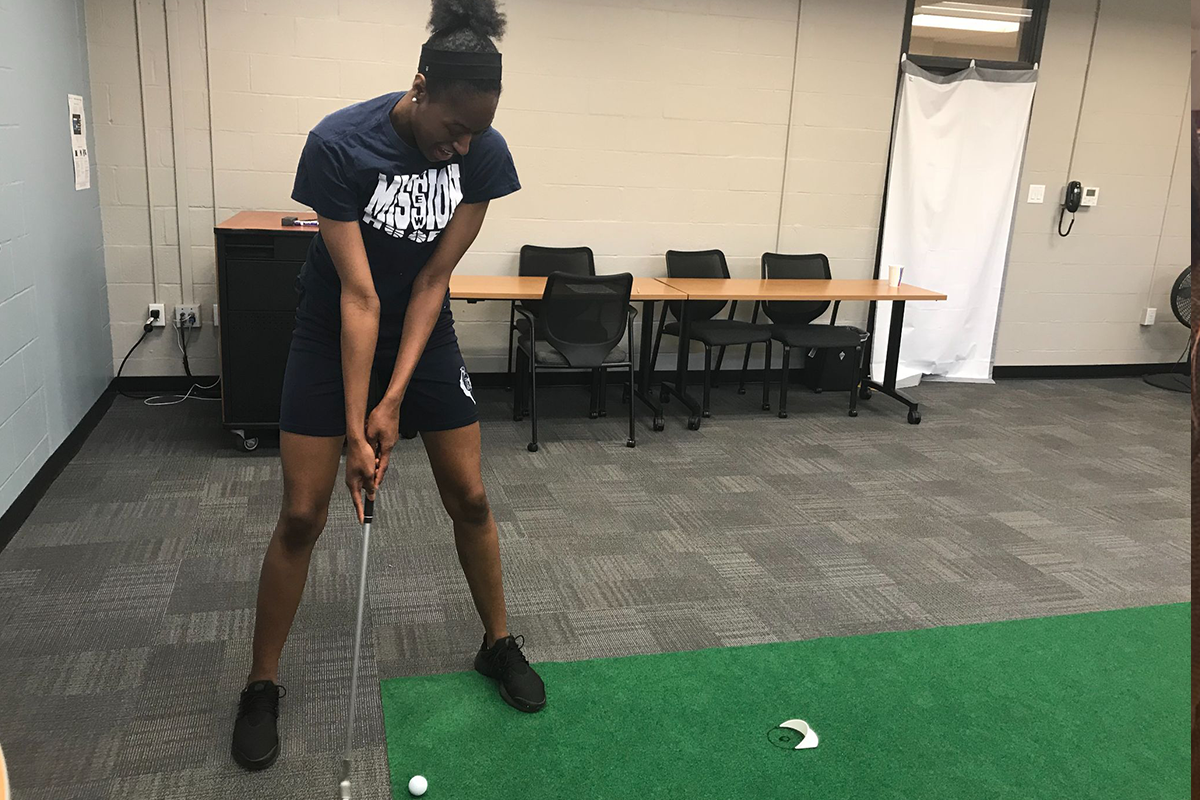
FAQ's About SCAN Lab Participation
Yes! The electrodes simply record naturally occurring electricity that is produced in your brain. We are not altering your brainwaves at all with the electrodes, and they are very commonly used to look at sleep and waking brain activity.
Yes, you can! If you need contacts or glasses to see, we do insist you wear them during all eye tracking tasks. We will work with them, though sometimes it is difficult with very strong prescriptions, glasses with strong anti-glare coating, and bi-focals.
In our SCAN concussion research, we need to examine both people who have had a concussion and people who have never had a concussion (controls) to really understand what a concussion does to someone’s behavior. So we are looking for both people who have recently had a concussion AND people who have never had a concussion! We also do a number of other research projects that are not concussion-focused at all and we would love for you to participate!
In our SCAN concussion research, we need to examine both people who have had a concussion aFor most of our research studies you must be 18 years of age or older to participate. You also must have normal, or corrected-to normal vision. For some, but not all of our studies you must have either had a recent concussion, or have never had a concussion.nd people who have never had a concussion (controls) to really understand what a concussion does to someone’s behavior. So we are looking for both people who have recently had a concussion AND people who have never had a concussion! We also do a number of other research projects that are not concussion-focused at all and we would love for you to participate!
If you are in a class that allows for psychology research participation for extra credit, we can give you that extra credit through SONA. If you are unsure, feel free to ask your professor or us if this is a possibility. Extra credit points are based on the length of the study and will vary depending on the study (or studies) in which you participate.
For some of our research projects, we can pay you for your time in either Amazon or Dunkin’ Donuts gift cards (participant’s choice). Gift card amounts are based on the length of the study and will vary depending on the study (or studies) in which you participate.
No! We have had students of many different majors participate in our data collection. We would discuss with you whether this research would count as an elective course toward your major or as a general elective. Feel free to reach out for more information.
Yes! We will be collecting data over summer breaks – if you are in the area and would like to either help us collect data as part of our team, or if you would like to participate in our studies, please reach out!
Leadership Spotlights
Associate Professors and Co-Principal Investigators of the SCAN Lab, Laura Kurdziel and Allison Seitchik lead a team of research assistants and faculty collaborators across campus.
Associate Professor, Psychology
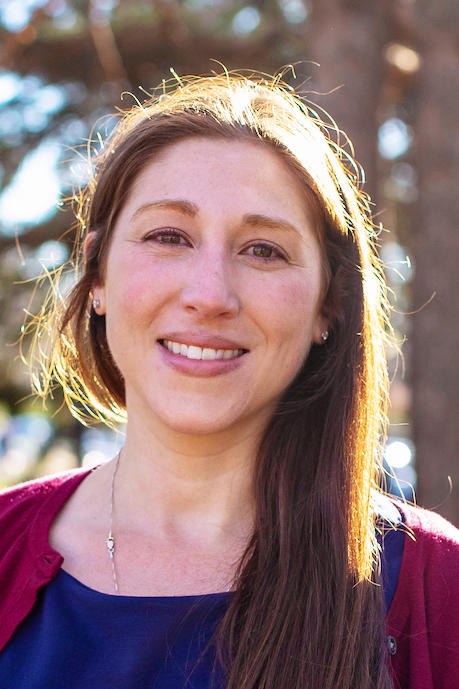
Associate Professor, Psychology

Our Commitment to Diversity, Equity & Inclusion
We strive to create a lab that values and fully includes individuals from diverse backgrounds, identities, beliefs, values, perspective, experiences, and ideas. This lab is committed to creating a trusting and collaborative environment where diversity will be respected including differences in race, religion, class, sexual orientation, gender and gender-identity, age, body-type, disability, and psychological struggle.
We seek to recruit, train, and support individuals from diverse backgrounds and those from historically underrepresented groups. Research even suggests that diverse labs can be more successful.
It is our duty as scientists to provide an inclusive environment that respects and represents the world in which we study and hope to provide possible interventions for. This is a collaborative, open, and iterative process where we are continuously trying to obtain this inclusive goal within our lab. We acknowledge that we will make mistakes, as we all do, but we must learn and take corrective actions.
 Eye Tracking During a Shooter Decision-Making Task
Eye Tracking During a Shooter Decision-Making Task